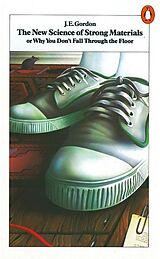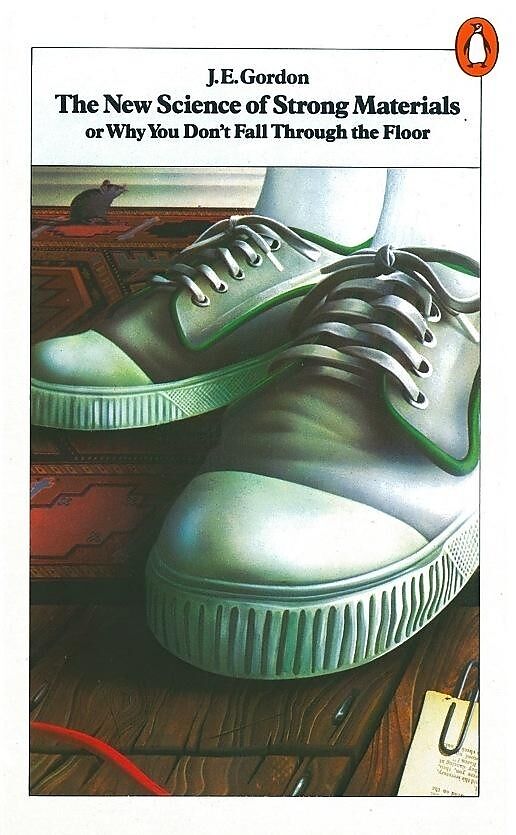The New Science of Strong Materials
Einband:
Kartonierter Einband
EAN:
9780140135978
Untertitel:
Or Why You Don't Fall Through the Floor
Genre:
Allgemeines & Lexika
Autor:
J E Gordon
Herausgeber:
Penguin Books Ltd
Auflage:
2nd ed. Repr.
Anzahl Seiten:
288
Erscheinungsdatum:
28.03.1991
ISBN:
978-0-14-013597-8
Informationen zum Autor James Edward Gordon was born in 1913. He took a degree in naval architecture at Glasgow University and worked in wood and steel shipyards, intending to design sailing ships. On the outbreak of the Second World War he moved to the Royal Aircraft Establishment at Farnborough, where he worked on wooden aircraft, plastics and unorthodox materials of all kinds. He designed the sailing rescue dinghies carried at one time by most bomber aircraft. He later became head of the plastic structures sections at Farnborough and developed a method of construction in reinforced plastics which is now used for a number of purpose in aircraft and rockets. For several frustrating years he worked in industry on the strength of glass and the growth of strong 'whisker' crystals. In 1962 he returned to government service as superintendent of an experimental branch at Waltham Abbey concerned with research and development of entirely new structural materials, most of which were based on 'whiskers'. He was Industrial Fellow Commoner at Churchill College, Cambridge, and became Professor of Materials Technology at the University of Reading, where he was later Professor Emeritus. He was awarded the British Silver Medal of the Royal Aeronautical Society for work on aircraft plastics and also the Griffith Medal of the Materials Science Club for contributions to material science. His book, Structures or Why Things Don't Fall Down, is also published in Penguin. Professor Gordon died in 1998. In its obituary The Times wrote of him that he was 'one of the founders of materials science' and that he wrote 'two books of outstanding literary quality ... at once entertaining and informative, providing absorbing interest for both expert and student'. Klappentext James Edward Gordon was born in 1913. He took a degree in naval architecture at Glasgow University and worked in wood and steel shipyards! intending to design sailing ships. On the outbreak of the Second World War he moved to the Royal Aircraft Establishment at Farnborough! where he worked on wooden aircraft! plastics and unorthodox materials of all kinds. He designed the sailing rescue dinghies carried at one time by most bomber aircraft. He later became head of the plastic structures sections at Farnborough and developed a method of construction in reinforced plastics which is now used for a number of purpose in aircraft and rockets. For several frustrating years he worked in industry on the strength of glass and the growth of strong 'whisker' crystals. In 1962 he returned to government service as superintendent of an experimental branch at Waltham Abbey concerned with research and development of entirely new structural materials! most of which were based on 'whiskers'. He was Industrial Fellow Commoner at Churchill College! Cambridge! and became Professor of Materials Technology at the University of Reading! where he was later Professor Emeritus. He was awarded the British Silver Medal of the Royal Aeronautical Society for work on aircraft plastics and also the Griffith Medal of the Materials Science Club for contributions to material science. His book! Structures or Why Things Don't Fall Down! is also published in Penguin. Professor Gordon died in 1998. In its obituary The Times wrote of him that he was 'one of the founders of materials science' and that he wrote 'two books of outstanding literary quality ... at once entertaining and informative! providing absorbing interest for both expert and student'. Zusammenfassung All questions about the nature of materials are vital to engineers but also fascinating as scientific problems. Using both SI and imperial units, Gordon's account of material science is a demonstration of the sometimes curious and entertaining ways in which scientists isolate and solve problems....
Autorentext
James Edward Gordon was born in 1913. He took a degree in naval architecture at Glasgow University and worked in wood and steel shipyards, intending to design sailing ships. On the outbreak of the Second World War he moved to the Royal Aircraft Establishment at Farnborough, where he worked on wooden aircraft, plastics and unorthodox materials of all kinds. He designed the sailing rescue dinghies carried at one time by most bomber aircraft. He later became head of the plastic structures sections at Farnborough and developed a method of construction in reinforced plastics which is now used for a number of purpose in aircraft and rockets.
For several frustrating years he worked in industry on the strength of glass and the growth of strong 'whisker' crystals. In 1962 he returned to government service as superintendent of an experimental branch at Waltham Abbey concerned with research and development of entirely new structural materials, most of which were based on 'whiskers'. He was Industrial Fellow Commoner at Churchill College, Cambridge, and became Professor of Materials Technology at the University of Reading, where he was later Professor Emeritus. He was awarded the British Silver Medal of the Royal Aeronautical Society for work on aircraft plastics and also the Griffith Medal of the Materials Science Club for contributions to material science. His book, Structures or Why Things Don't Fall Down, is also published in Penguin.
Professor Gordon died in 1998. In its obituary The Times wrote of him that he was 'one of the founders of materials science' and that he wrote 'two books of outstanding literary quality ... at once entertaining and informative, providing absorbing interest for both expert and student'.
Zusammenfassung
All questions about the nature of materials are vital to engineers but also fascinating as scientific problems. Using both SI and imperial units, Gordon's account of material science is a demonstration of the sometimes curious and entertaining ways in which scientists isolate and solve problems.

Leider konnten wir für diesen Artikel keine Preise ermitteln ...
billigbuch.ch sucht jetzt für Sie die besten Angebote ...
Die aktuellen Verkaufspreise von 6 Onlineshops werden in Realtime abgefragt.
Sie können das gewünschte Produkt anschliessend direkt beim Anbieter Ihrer Wahl bestellen.
Loading...
Die aktuellen Verkaufspreise von 6 Onlineshops werden in Realtime abgefragt.
Sie können das gewünschte Produkt anschliessend direkt beim Anbieter Ihrer Wahl bestellen.
| # | Onlineshop | Preis CHF | Versand CHF | Total CHF | ||
|---|---|---|---|---|---|---|
| 1 | Seller | 0.00 | 0.00 | 0.00 |
